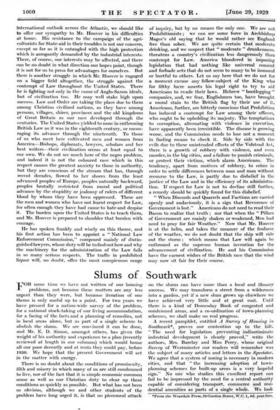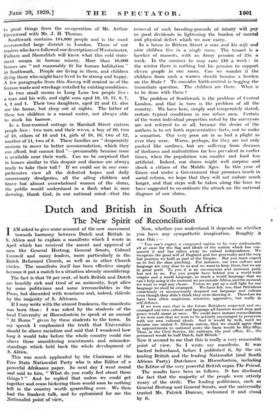Shims of_ Southwark
FOR some time we have not written of our housing problems, not because these matters are any less urgent than they were, but because iteration of one theme is only useful up to a point. For two years we have pressed for a nation-wide survey of the problem, for a national stock-taking of our living accommodation, for a facing of the facts and a planning of remedies, not in local areas alone, but as part of a single scheme to abolish the slums. We are convinced it can be done, and Mr. E. Simon, amongst others; has given the weight of his authority and experience to a plan (recently reviewed at length in our colomns) which would house all our poor decently and at rents they could pay, before 1950. We hope that the present Government will act in the matter with energy.
There is no doubt about the conditions of promiscuity, filth and misery-in which many of us are stillcondemned to live, nor'of the fact that it is simple economic common sense as well as our Christian duty to clear up these conditions as quickly as possible. But what has not been so obviOus, although we and other students of the problem have long urged it, is that no piecemeal attack on the slums can have more than a local and illusory success. We may transform a street from a wilderness into a garden, yet if a new slum- grows up eliewhere we have achieved very little and at great cost. Until there is a kind of Domesday Book of congested and condemned areas, and a co-ordination of town-planning . . schemes, ire shall make no real progress.
A recent .pamphlet, entitled A Survey of Housing in - . Southwark*, proves our contention up to the hilt. " The need for legislation. preventing indiscriminate industrial develoPment is elearlY proved," write the authors, Mrs. Barclay and Miss Perry, whoSe original Survey of Westminster our readers will remember was the subject of many articles. and letters in the Spectator. We agree that a system of zoning is necessary in-modern cities, and that " the increasing adoption of town- planning schemeS for built-up areas is a very hopeful sign." No one' who Studies this excellent report can fail to be impressed by the need for a Central authority capable of conSidering transport, .conimerce and 'resi- dential amenities as parts of a single whole. We look *From the Weardale Press, 26 Gordon Street, W.C. 1, 4d. post free. to great things from the co-operation of Mr. Arthur Greenwood with Mr. J. H. Thomas.
Southwark contains 184,000 people and is the most overcrowded large district in London. Those of our readers who have followed our descriptions of Westminster, Fulham and Shoreditch will know what this cold state- ment means in human misery. More than 10,000 houses are " not reasonably fit for human habitation " in Southwark. People are living in them, and children dying there who might have lived to be strong and happy. A few paragraphs from this Survey will remind us of the human waste and wreckage entailed by existing conditions.
In two small rooms in Long Lane ten people live : a man and his wife, and eight sons aged 16, 13, 11, 8, 7, 4, 2 and 1. Their two daughters, aged 22 and 15, also use the house, but sleep out at nights. The father of these ten children is a casual coster, not always able to stock his barrow.
In a four-roomed cottage in Marshall Street sixteen people live : two men and their wives, a boy of 20, two of 18, others of 16 and 14, girls of 18, 16, two of 12, another of 11, two of 8. These families are " desperately anxious to move to better accommodation, which they can afford, but cannot find "—presumably because none is available near their work. Can we be surprised that in houses similar to this despair and disease are always ready to take their toll ? If we could see in one com- prehensive view all the defeated hopes and daily unnecessary drudgeries, all the ailing children and brave but almost overwhelmed women of the slums, the public would understand in a flash what is now dawning, thank God, in our national mind—that the removal of such breeding-grounds of misery will pay us good dividends in lightening the burden of mental and physical defect which we now carry.
In a house in Bittern Street a man and his wife and nine children live in a single room. The tenant is a hawker of mascots, with an Army pension of 25s. a week. In the summer he may earn £10 a week : in the winter there is nothing but his pension to support eleven people in one room. Can we wonder if the children from such a warren should become a burden on the State ? To consider birth-control is begging the immediate question. The children are there. What is to be done with them ?
The problem of Southwark is the problem of Central London, and that in turn is the problem of all the country. We have here, simply and temperately stated, certain typical conditions in one urban area. Certain of the worst individual properties noted by the surveyors are not referred to at all, because the desire of the authors is to set forth representative facts, not to make a sensation. Our very poor are in as bad a plight as ever they were. Worse, perhaps, for they are not only packed like sardines, but are suffering from diseases of darkness and malnutrition far less prevalent in earlier times, when the population was smaller and food less artificial. Indeed, our slums might well surprise and shock a citizen of the Middle Ages. In this year of Grace and under a Government that promises much in social reform, we hope that they will not endure much longer, and that steps will be taken along the lines we have suggested to co-ordinate the attack on the national disgrace . of our slums.









































 Previous page
Previous page